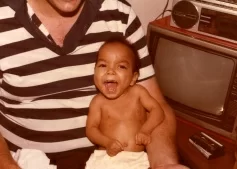 without a thought on my part. But Luke came to my mind yesterday and I looked up some information on him and discovered that his birthday had just passed. I found this old article that I wrote about Luke a few years ago. I thought I'd share it again. I am convinced that there are important and significant lessons we can learn from his life, and that I need to regularly share what I think they are. I hope you enjoy this!
without a thought on my part. But Luke came to my mind yesterday and I looked up some information on him and discovered that his birthday had just passed. I found this old article that I wrote about Luke a few years ago. I thought I'd share it again. I am convinced that there are important and significant lessons we can learn from his life, and that I need to regularly share what I think they are. I hope you enjoy this!The mysteries of God are a part of the Christian life that can often lead to confusion, doubt and even discouragement for believers.
- For some, it's a pride thing. We want to have answers – we want to understand, to be able to grasp the complexities of Biblical truth and God's plan for mankind.
- For some, God's mysteries – the unexplained things of life – are stumbling blocks to faith:
1. Why do bad things happen to good people?
2. Why does He allow pain, suffering and evil to thrive in our world?
Several months ago we were witnesses to the aftermath of the tragedy in Pennsylvania involving the Amish community, where, good, decent, hard working, non violent people were subjected to unspeakable cruelty towards their children. How can this happen?
3. One of our CSC children, who grew up in the worst poverty imaginable in Cebu City, was adopted into a family in the United States several years ago. Well meaning people would tell her how lucky she was and how God obviously had a wonderful plan for her life. She had a hard time with that and would sometimes ask her parents, "But what about all the kids who are still there, who weren't adopted, and who are still suffering and dying? What is God's wonderful plan for their lives? Why me and not them?
For many of us, we celebrate the goodness of God in our lives, we praise him for his healing, for material comforts, for blessing our efforts – even as we observe people who remain sick or disabled, who suffer in poverty – those who efforts and initiatives end in disappointment and ruin.
There are two extremes in terms of people's reactions to the things about God and life that are not understood.
1. There are those who try in vain to grasp the ungraspable – to be able to reduce the mysteries to understandable formulas or explanations. I remember a young seminarian who came to Cebu and who filled the pulpit of our church on a Sunday evening. He preached for an hour on the "peace of God that passes all understanding." Perhaps he felt that if he preached long enough he could crack that nut and open our understanding!
We all know those who have reduced the book of Revelation to precise charts and timetables, giving us easy to understand categories for all of human history and, most especially, the times to come.
2. A second category are those who shake their heads and say, "We'll only know these answers when we get to heaven." They suspend inquiry, not bothering to seek answers to the perplexing questions of life.
Living and working in a Third World country like the Philippines brings some of these mysteries to the front of our lives. Poverty, and all that goes with it, is "in your face." People often ask me "How do you like living in the Philippines?" That's a tough one to answer. Life anywhere has its highs and lows. Some days are great, others are difficult. I often answer this way:
1. When I'm sitting down to a nice breakfast I am aware that, within a few meters of my house are families that have no breakfast.
2. When I'm driving to the office or the Shelter I often pass people walking along the road who, for lack of a few cents can not even afford public transportation and must walk.
3. When I stop to buy medicine for my family or the CSC kids, there are people standing nearby whose children are dying for lack of that very same medicine.
Why am I blessed and they are not?
I recall a conversation with a missionary a few days after Cebu was hit by a strong typhoon. Many of our CSC workers lost their roofs or their entire homes. The houses of the poor were devastated by the high winds and torrential rains. The missionary said that it had been such a miracle how God spared the missionary homes from damage, holding his hands of protection around us during the storm. I remember wondering whether it wasn't more a matter of our having cement houses and strong metal roofs.
Why did our CSC kids have to suffer so much? And how much more, those who live on the street and cannot be admitted to CSC?
These are tough questions. When it comes to trying to understand our own suffering, the Bible gives some answers. For example, Romans 5:3-4 tells us that suffering produces perseverance, perseverance character, and character, hope. And the Bible gives us additional hope that we will someday come to see God's purpose and mysteries:
"But now we see through a glass dimly, but then face to face."
And we hear the testimonies of Christian brothers and sisters who have lived through terrible times and have turned negatives into positives in their lives.
Several months ago I was attending a conference in Bismark, North Dakota. One of the featured speakers was Steve Saint, Steve's father, Nate Saint, was one of the five missionaries killed in 1956 by Aucan warriors in Equador. Steve told about what that tragic day meant to his family, and what it was like when his dad, his hero, didn't come home that day. We saw video of his current family life, and saw a man who was interacting with Steve's children, and who was being referred to as "Uncle." It turns out that this was the very man who had killed Steve's father, who had come to know Jesus and had experienced the forgiveness of God and of the Saint family and now was a part of their family – an amazing story of how good things had come out of tragedy and suffering.
So the clear message is that God has a plan for our lives, we will discover that plan in the right time. He is writing our life's stories, but some of the chapters are difficult ones.
We can understand this. We can, when aided by the Holy Spirit, see how difficulties and suffering are part of a purification process for us, and that we, like Job, will eventually be better people for it.
But what about people who, because of major disabilities, are unable to understand their situation, unable to discern the hand of God or his plan for their lives. Where is the purification and growth and ultimate value for these people? What could God's purpose possibly be?
Back on 1982 a baby was born in a charity ward in a small hospital in Cebu City. 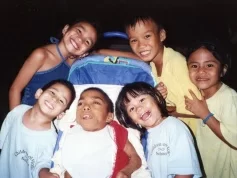 The baby underwent cardiac arrest during birth and was without oxygen for an extended time. Unlike many cases of charity patients, the hospital staff decided to resuscitate the baby, even after he had suffered massive brain damage and cerebral palsy. The baby's mother abandoned him in the hospital, and after a couple months Luke was referred to CSC. When we took him in he appeared to be a bouncing baby boy. We did not know that he would not develop physically beyond about a year and a half, or mentally beyond a few months. Luke would never speak, nor have voluntary movement of his arms or legs.
The baby underwent cardiac arrest during birth and was without oxygen for an extended time. Unlike many cases of charity patients, the hospital staff decided to resuscitate the baby, even after he had suffered massive brain damage and cerebral palsy. The baby's mother abandoned him in the hospital, and after a couple months Luke was referred to CSC. When we took him in he appeared to be a bouncing baby boy. We did not know that he would not develop physically beyond about a year and a half, or mentally beyond a few months. Luke would never speak, nor have voluntary movement of his arms or legs.
Luke became a fixture at CSC. For over 23 years he was an integral part of our lives and a symbol of CSC and what we are all about.
Many times Luke would be hospitalized – often due to upper respiratory infections. He fought for his life many times. There were at least a dozen times when we were sure that he would die. The doctors had told us that he wouldn't make it past five years old. Then they revised it to nine, then 11 – certainly he wouldn't reach his teenage years.
One time, when Luke was critically ill our staff met to pray and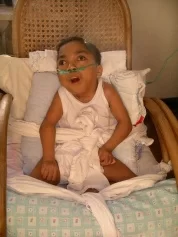 I asked them to reflect on his life. Here is why: I believe that God had a purpose for Luke's life when he created him. I believe that He uses people like Luke to teach us important things. But here is the rub: If we don't spend time reflecting on these lessons, then Luke's life is useless. Its up to us to allow God to make sense of Luke's life.
I asked them to reflect on his life. Here is why: I believe that God had a purpose for Luke's life when he created him. I believe that He uses people like Luke to teach us important things. But here is the rub: If we don't spend time reflecting on these lessons, then Luke's life is useless. Its up to us to allow God to make sense of Luke's life.
And what are the lessons that we found? What has God taught us through his life?
1. First, life is precious. Even though he had nothing to live for, from the world's point of view, Luke clung to live almost ferociously. Some of us who have much more to live for take life casually, we take life for granted. Not Luke. Every day was a struggle. Every breath had to be fought for. Life is a gift from God and we should treat it carefully.
2. God has provided us with opportunities, through Luke's life, to minister to him in significant and life-saving ways. He has provided an avenue for us to live out the biblical mandate to minister unto the "least of these," because, truly, Luke was in that category. Hundreds of people have been given a blessing to participate in the support of CSC that reaches out to children like Luke and many others with other special needs.
3. In so doing, He has given us a chance to show others a Godly value system that doesn't reserve love and attention for those who have something to give back, or who have "potential" or a bright future. For many people who live in a developing country, where resources are limited, this has been a difficult lesson to learn. How could we justify spending so much money for Luke's hospitalization when other, "normal" kids needed care? Luke's life gave us the opportunity to teach about the value of life and about how God looks at all of us.
4. Luke has been a tremendous ambassador for CSC. People around the world remember observing the loving care that he received by our staff and workers. They remember his famous smiles. They may quickly forget the names of the staff or other children, but they remember Luke. "How's Luke doing?" we get asked wherever we go to talk about the ministry of CSC. And our care of Luke helps us explain the true nature and core values of our work in the Philippines.
5. Luke has been a safety valve for those that had an opportunity to know him. My job as Field Director of CSC involves lots of administrative chores, like making budgets, government relations and various kinds of problem solving. There are days when I get stressed out and start to feel the weight of the world on my shoulders. But all I needed to do is to drive a few short miles to where Luke lived, to hold him in my arms, and I get a clear picture of what real struggles are all about. My struggles paled in comparison to what Luke faced every day. Self pity may be easy for some people, but those that knew Luke have no excuse for feeling sorry for themselves. What a great gift that was to all of us.
A little over a week before we left Cebu, Marlys called me on my cell phone and told me that I should get to the hospital quickly, as Luke wasn't doing well. He had been hospitalized for over a week and his breathing was bad. I had gotten messages similar to this one throughout Luke's life, so I went to the office and took care of a few things. But the Lord laid it on my heart to go see Luke and when I entered his room his breathing was extremely labored. He looked different than I had ever seen him, and it became clear that he was dying. I sat down next to him, kissed him and looked into his eyes. For 23 years we had loved this boy. It wasn't easy to say goodbye. I said to him, "Luke. You can go. Go to be with Jesus, Luke. I love you." Within a couple of minutes Luke took his last breath. 23 years of pain, suffering, limitations, hospitalizations, forced breathing, skin rashes and infections were over. We would never see Luke's smile again.
As Luke was dying in that hospital room, I made a promise. I'm not sure if I was making a promise to Luke, to God or to myself. But I decided then and there that I was going to talk about Luke on our coming furlough. I believed then and do now, that the church of Jesus Christ needs to hear about Luke, that the lessons of his life are important ones. Many Americans are complainers - full of self pity. People who have so many material comforts are unsatisfied. American discourse is increasingly a chorus of victim and entitlement claims. Charles Sykes, in his book "A Nation of Victims: The Decay of the American Character" states that, "in a nation where everyone is a victim, no one is a victim." In our preoccupation with our own needs we have a hard time seeing the needs of others – people like Luke.
In his song "God Help the Outcasts," the Hunchback of Notre Dame poses several difficult issues:
I don't know if there's a reason
Why some are blessed, some not
Why the few You seem to favor
They fear us, flee us,
Try not to see us.
The first part we have already examined. The second is our call to arms. "Why the few You seem to favor, they fear us, flee us, try not to see us."
I don't know what factors might make it difficult for us to see the needs of society's outcasts. Perhaps we are too busy. Maybe our personal and church calendars are so full that there just isn't room for Luke, or the man who had fallen to thieves at the side of the road, to break into our day. Maybe we are numbed or fatigued by the needs of others, or simply overwhelmed by the circumstances of our own lives. Maybe we have become cynical. "Why did that guy travel this road at this time carrying that amount of money? He deserves what he got!"
Maybe, just maybe, Luke can help cut through the apathy, the self-centeredness and cynicism of our lives. He was a person with significant needs that he didn't cause. He was totally dependent on others to live. His life had none of the possibilities and opportunities that we take for granted every day. He needed us so very much. Maybe Luke can serve as a symbol of many others that we come into contact with. Maybe Luke can help us rescue our lives.
Nutrition is Important
Recently, Children of Hope School emphasized nutrition along with the rest of the schools in the Philippines. There are some many benefits to eating healthy foods. The children learned many things from the basics of what foods are healthy to why some foods are good for you and some are bad for you.
Enjoy this song from two of the students!
God bless and Godspeed to you, Auntie Sandy!
Last Saturday, the staff, the Aunties, Uncles and children of CSC sang the traditional farewell song for and prayed over Auntie Sandy. It was a surreal experience to be saying goodbye to one of CSC's founders. Auntie Sandy has been a fixture at CSC for the past 36 years. She is a very important and real part of so many of our children's and adoptive families' stories. She has left an impressive legacy and she will not be forgotten.
There are many things we will miss about Auntie Sandy:
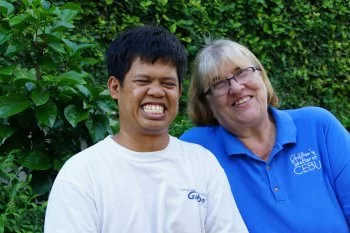
Like the fact, that she and only she, can put that beaming smile on Joemar's face! :)
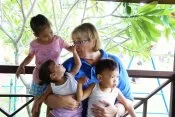
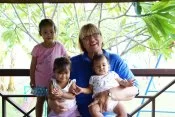
The fact that her arms and her heart are always open for a child in need of loving.
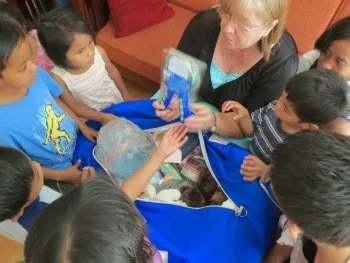
Her excitement when passing out donations!
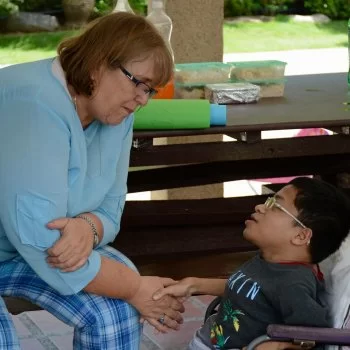
How she values and and encourages others.
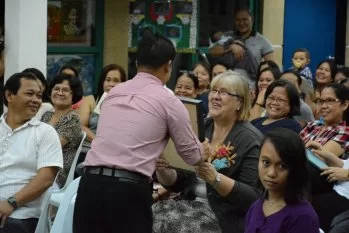
What she means to everyone at CSC: Aunties, Uncles, staff and children.
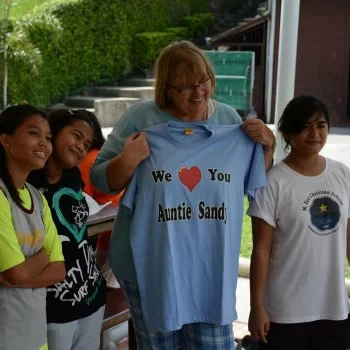
How much she loves the color blue! ;)
There are so many more things about Auntie Sandy that we miss; I cannot possibly list them all here. And truth be told, her absence is felt every day, but the shelter that she and others started all those years ago, must continue on and move forward. Because there are still children that need help. God's work is not done in Cebu. And though CSC will not be the same without her as it was with her, she has left a foundation upon which this ministry can and will build.
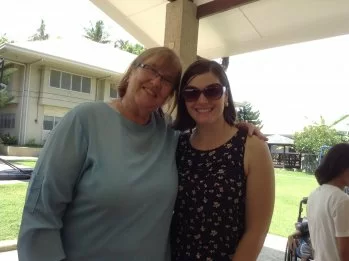
I have had the privilege of working alongside Auntie Sandy for the past few years. I first started working at CSC in 2011, serving as the Interm Child Development Director while Sandy had a year-long furlough in MN. What a whirlwind year of learning and growth that was! When she returned and resumed her role as the Director, I became an additional member of the Child Development team, working also with Ruth and Amy. In preparing for Sandy's retirement, I was asked to direct the Child Development department. It is an honor I have accepted. I have learned much in the 4 years I have been here and I know I will continue to learn. Thank you, Auntie Sandy, for your wisdom shared and the opportunity to watch you at work.
God Bless and Godspeed to you, Auntie Sandy!
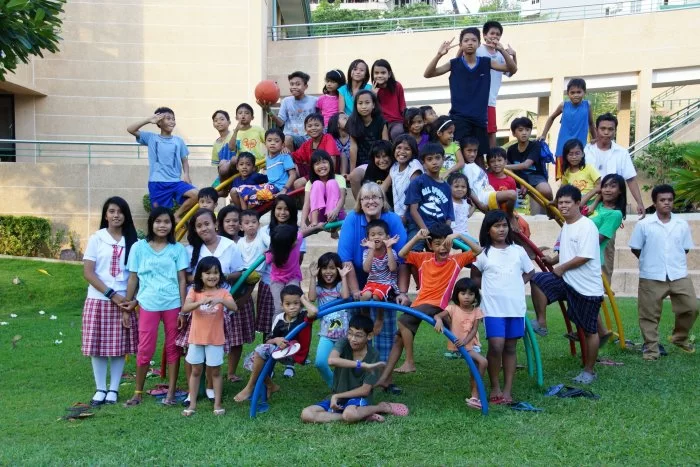
Please pray for Auntie Sandy as she continues to serve CSC in MN over the next year and as she moves into retirement, that God will continue to use her to further His kingdom. Please pray for CSC in Cebu as well. I would appreciate your prayers as I start my new position and as the Child Development team learns to function with only three members now instead of four.
Update on Julieto
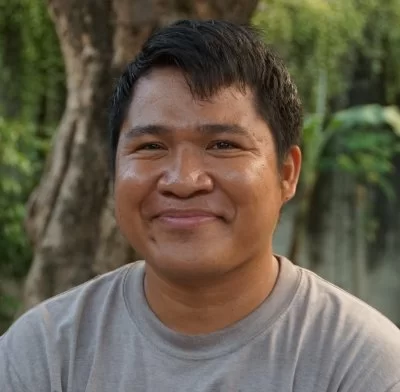 Many people who are familiar with CSC are familiar with
Julieto. He hasn’t been around much the past several months because he’s been
working as a baker. It was pretty exciting news when he got his job. You maybe
read about it on facebook or heard about it from someone else connected with
CSC.
Many people who are familiar with CSC are familiar with
Julieto. He hasn’t been around much the past several months because he’s been
working as a baker. It was pretty exciting news when he got his job. You maybe
read about it on facebook or heard about it from someone else connected with
CSC.
I’ve been looking through old blog posts and seeing Julieto the other day made me think about some of the posts I read. He’s had quite a journey through his time at CSC and it’s been great to get to know him a little bit. You should get to know him better and read these two old posts!
As I mentioned earlier he finally got that job as a baker. It’s common for many jobs in the Philippines for people to be employed on short contracts, usually six months or so. Julieto enjoyed his job and recently fulfilled his contract but he’s glad to have a little break. He was working very hard, often picking up overtime shifts and most of us rarely saw him.
That was last week and he’s already looking for more work. Please pray for Julieto and that God will lead him as he looks for the next thing!
Uncle Mitch
I wanted to take this time to highlight one of our missionary staff---Uncle Mitch. It is more likely that you find him behind the camera, rather than in front of it, so I had to search far and wide to find pictures that he is actually in! ;)
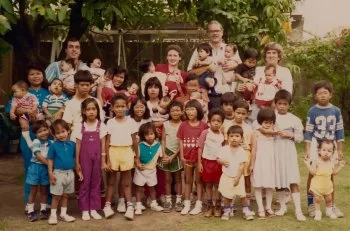
Uncle Mitch cares for and invests in CSC's children. And has for quite some time, as you can see!
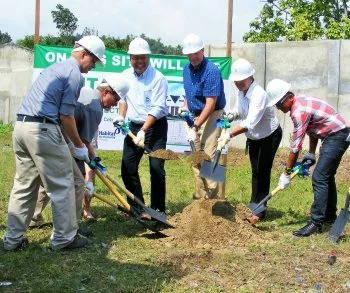
He represents CSC well in all sorts of occasions. And is a pro at groundbreaking ceremonies!
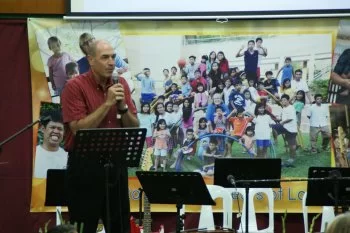
He is an organized, polished and entertaining emcee!
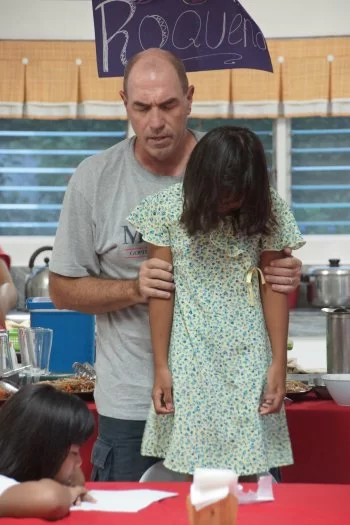
He lovingly prays over our kids at birthday parties!
These are just a few reasons why Uncle Mitch is important to CSC's ministry and to our children. Next week he will be speaking at GLOBAL, a major adoption conference, held in Manila. Please pray for him regarding his speech and his time there, but beyond next week, please pray for him as he continues to oversee so many tasks that are integral to the smooth running of this ministry.
Erna and Bobong
Erna Ahlmann is a former CSC resident who returned to CSC for the summer to work at Children of Hope School, filling in as an instructional assistant for a person who was on maternity leave. Since Erna is an instructional assistant at an elementary school in Minnesota, this was a perfect fit. A number of cool stories could be shared about Erna and her time in Cebu, so here is one story:
Actually this is going to be more about Tomas Marayan who is affectionately known as Bobong around school. Bobong has worked as a maintenance man at the school since it opened in August of 1998! He does pretty much any and everything related to taking care of the facilities. If we have a question about anything at school, Bobong is the go-to guy. He also does many tasks that are probably not really part of his job description like serving morning snacks to the kids.
Well, the first day Erna was at school and we introduced her to Bobong, he remembered her immediately! I guess we shouldn’t have been surprised, but a lot of kids have come and gone over the years and Erna left more than 15 years ago. But Bobong remembered Erna and he went on to tell her who her teacher had been (Teacher Grace) and where she sat in the classroom. Wow!
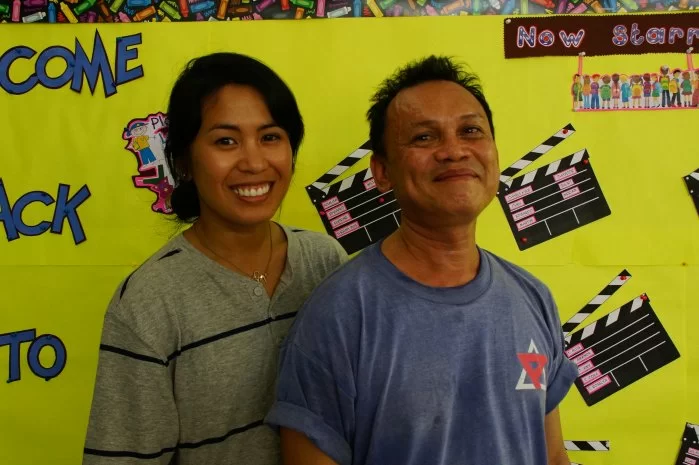 Later in the day, we had a problem with the
laminator and Bobong was trying to fix it.
Erna jumped right in and helped Bobong, fanning him to stay cool and problem
solving. Right away it struck me how
significant this day was with Bobong and Erna meeting each other again. Erna went to Cebu to give back some of the
kindness she had been shown. Bobong had
helped Erna when she was a very young girl and his heart is so big he even
remembered her after all those years. Here
they were working together to help the children who are at the shelter now. Priceless.
Later in the day, we had a problem with the
laminator and Bobong was trying to fix it.
Erna jumped right in and helped Bobong, fanning him to stay cool and problem
solving. Right away it struck me how
significant this day was with Bobong and Erna meeting each other again. Erna went to Cebu to give back some of the
kindness she had been shown. Bobong had
helped Erna when she was a very young girl and his heart is so big he even
remembered her after all those years. Here
they were working together to help the children who are at the shelter now. Priceless.





